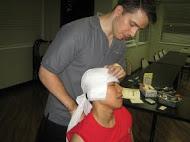Looking for CPR training? Advanced and basic courses can be found all over the country, at various training locations. A CPR training program in Las Vegas CPR is quite affordable without compromising the quality of education we give our trainees. There is a total of eight programs available – five training programs and three re-certification programs. All of these programs can be found in all our locations (six cities in five states). To give you an idea of what programs are available, here are all our available classes at Las Vegas CPR:
- Heartsaver – basic CPR/AED for the general public
- Heartsaver C – basic CPR/AED for people in health care
- Basic Life Support for Health Care Providers – basic CPR/AED (one and two-person rescue) for HCPs
- Basic Life Support for Health Care Providers re-certification
- Advanced Cardiac Life Support – advanced CPR for medical management of adults
- ACLS re-certification
- Pediatric Advanced Life Support – advanced CPR for medical management of children
- PALS re-certification
Preventing CVDs

As much as CPR is a part of every allied health rescuer’s training, prevention is also key in keeping deaths due to cardiac arrest low. Most of cardiovascular diseases are entirely lifestyle-related, meaning that they are caused by choices we make regarding diet, exercise, and vices. If a person lives a sedentary-life and has an unhealthy diet high in fat and sodium, he is at great risk for developing a heart problem. Smoking is another culprit, because nicotine damages blood vessels, making the areas prone to a build-up of inflammatory cells and fatty deposits – plaque build-up! So how do you prevent CVDs?
- Keep your diet healthy. That means eating the right amount of vegetables and fruits daily, and avoiding food that is too salty or high in fat and cholesterol.
- Have an exercise regimen. No matter how busy you are, having an exercise regimen (at least three times a week, mild to moderate exercise) will improve your cardiac health.
- Don’t smoke. Smoking causes our body to take in nicotine, a susbstance that damages blood vessels and contributes to plaque deposits and hypertension.
- If you have personal or family history of heart disease, make sure to get seen by a doctor regularly. This ensures that your health is being managed with the right diet, exercise, and medication (if you have any).
Giving CPR
CPR is a lifesaving skill that helps restore spontaneous circulation of blood in the body and regular respiration. The Chain-of-Survival is used as a guide when giving CPR:
- Activation of the emergency response system
- Starting compressions and ventilation
- Defibrillation with an AED
- Advanced Life Support
- Post-cardiac arrest care
CPR and first aid certification
All our training courses involve basic first aid training and will award a student with CPR/first aid certificates once completed. These certificates are only valid for two years and have to be renewed BEFORE they expire (through re-certification classes). If your certificate has expired, you cannot take a re-certification class; instead, you have to enroll in the (longer) training program again.
Re-certification is only available for three of our training programs.
